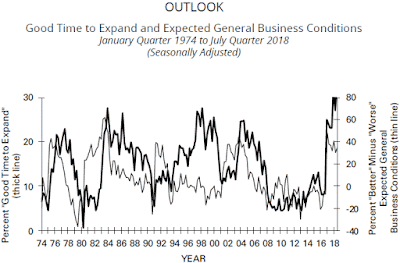NFIB Small Business Optimism Index for July 2018
The National Federation of Independent Business® (NFIB®) released its Small Business Optimism Index (SBOI) for July 2018:
=========
Predicted: 107.1
Actual: 107.9
=========
The previous month's SBOI reading was 107.2.
=========
=========
=========
From today's report (note text in bold):
=========
=========
Predicted: 107.1
Actual: 107.9
- Change from Previous Month: +0.653% (+0.7 point)
- Change from 12 Months Previous: +2.567% (+2.7 points)
=========
The previous month's SBOI reading was 107.2.
=========
 |
| Chart: NFIB Small Business Optimism Index - July 2018 Update |
=========
 |
| Chart: NFIB Small Business Outlook - July 2018 Update |
=========
From today's report (note text in bold):
"...The Small Business Optimism Index marked its second highest level in the survey’s 45-year history at 107.9, rising to within 0.1 point of the July 1983 record-high of 108. The July 2018 report also set new records in terms of owners reporting job creation plans and those with job openings. A seasonally-adjusted net 23 percent are planning to create new jobs, up three points from June. Thirty-seven percent of all owners reported job openings they could not fill in the current period, a one-point increase from June.
'Small business owners are leading this economy and expressing optimism rivaling the highest levels in history,' said NFIB President and CEO Juanita Duggan. 'Expansion continues to be a priority for small businesses who show no signs of slowing as they anticipate more sales and better business conditions.'
A net eight percent of all owners (seasonally adjusted) reported higher nominal sales in the past three months compared to the prior three months. July is the eighth consecutive strong month of reported sales gains after years of low or negative numbers. A net 35 percent of owners expect better business conditions, ticking up two points from June.
Additional July highlights include:
-- The percent of owners citing the availability of qualified workers as their number one business problem landed one point below the record high.
-- Reports of compensation increases remained strong.
-- Capital spending maintained a respectable pace but did not display the exuberance of its fellow indicators, although spending plans did post a gain.
-- Plans to add to inventory holdings were strong as strong sales continue to deplete stocks.
-- Profits continued to perform, and more firms raised prices, something that is easier when demand is strong.
'Small business owners have never been so optimistic for so long, helping to power the second longest expansion in history,' said NFIB Chief Economist Bill Dunkelberg. 'Despite challenges in finding qualified workers to fill a record number of job openings, they’re taking advantage of this economy and pursuing growth.'
Fifty-nine percent reported hiring or trying to hire (down four points), but 52 percent (88 percent of those hiring or trying to hire) reported few or no qualified applicants for the positions they were trying to fill. Twenty-three percent of owners cited the difficulty of finding qualified workers as their single most important business problem (up two points), one point below the 45-year record high..."
=========
- Small business survey questions can be found at the end of today's report.
- The baseline "100" score is associated with 1986 survey data.
Labels: business, hard_data, NFIB, Small_Business, Small_Business_Optimism_Index, Small_Business_Outlook, soft_data
|
--> www.FedPrimeRate.com Privacy Policy <--
CLICK HERE to JUMP to the TOP of THIS PAGE > SITEMAP < |



0 Comments:
Post a Comment
<< Home